Exeter Prize
The Exeter Prize is an annual prize awarded to the most outstanding article published in a refereed journal in the previous calendar year from the following fields: experimental economics, decision theory and behavioural economics.
Exeter Prize 2024 Winners
We are happy to announce the winners of the 2024 Exeter Prize for the best paper published in the previous calendar year in a peer-reviewed journal in the fields of Experimental Economics, Behavioral Economics and Decision Theory.
The winners are Erin Bronchetti (Swarthmore College), Judd Kessler (University of Pennsylvania and NBER), Ellen Magenheim (Swarthmore College), Dmitry Taubinsky (UC Berkeley and NBER) and Eric Zwick (University of Chicago and NBER) for their paper “Is Attention Produced Optimally? Theory and Evidence from Experiments with Bandwidth Enhancements”, published in Econometrica.
.webp)
As technology grows, the world imposes greater demands on our attention and offers better means for increasing our attentional bandwidth, so that questions about how well people manage the benefits and costs of bandwidth become increasingly important societal questions. Bronchetti et al.'s paper is a masterful synthesis of theory and experiment, offering insights into the rationality of human decision-making in the context of people's choice of attention environment.
Paul Samuelson once observed that the symmetry condition of the Slutsky matrix is a property that lies just beyond intuition, revealing deeper truths that are accessible only through rigorous mathematics. In this spirit, Bronchetti et al. tackle the empirical challenge of testing Slutsky symmetry to determine whether individuals rationally choose "bandwidth enhancements" in cognitive tasks.
The winning paper was selected by the panel of Erik Eyster (UC Santa Barbara), Rick Larrick (Duke University), and Muriel Niederle (Stanford University).
This year was again exceptionally competitive with a large number of outstanding nominations. In addition to the winner, this year’s shortlist was (in alphabetical order of first authors’ last names):
- Bordalo, P., Conlon, J. J., Gennaioli, N., Kwon, S. Y., and Shleifer, A. (2023). Memory and probability. The Quarterly Journal of Economics, 138(1), 265–311.
- Bronchetti, E. T., Kessler, J. B., Magenheim, E. B., Taubinsky, D., & Zwick, E. (2021). Is attention produced optimally? Theory and evidence from experiments with bandwidth enhancements. Econometrica, 91(2), 669-707.
- Friebel, G., Heinz, M., Hoffman, M., & Zubanov, N. (2023). What do employee referral programs do? Measuring the direct and overall effects of a management practice. Journal of Political Economy, 131(3), 633-686.
- Kvam, P. D., Marley, A. A. J., & Heathcote, A. (2023). A unified theory of discrete and continuous responding. Psychological Review, 130(2), 368-400.
- Saccardo, S., & Serra-Garcia, M. (2023). Enabling or limiting cognitive flexibility? evidence of demand for moral commitment. American Economic Review, 113(2), 396-429.

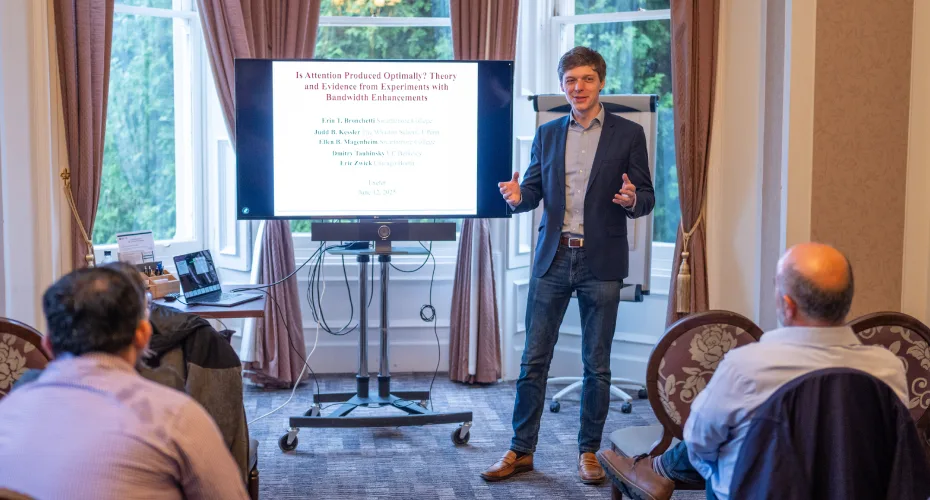
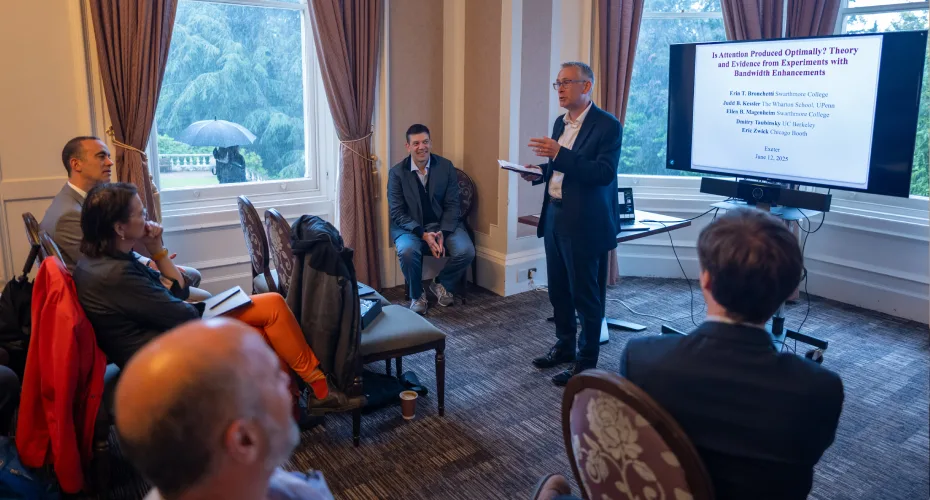
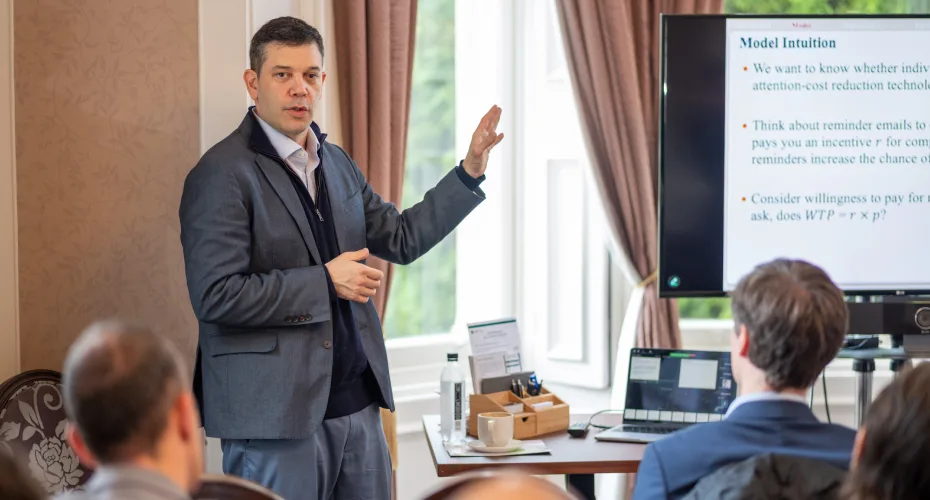
Previous prize winners and finalists
2023

We are happy to announce the winners of the 2023 Exeter Prize for the best paper published in the previous calendar year in a peer-reviewed journal in the fields of Experimental Economics, Behavioural Economics and Decision Theory.
The winners are Kirby Nielsen (Caltech) and John Rehbeck (Ohio State University) for their paper “When choices are mistakes”, published in The American Economic Review.
Best paper
The paper addresses fundamental aspects of rationality in economic theory. Do people accept the axioms of rational choice? Are violations of these axioms intentional or mistaken? And how do people respond if they discover that their choices violate the axioms? The research answers these questions with a number of clever empirical innovations.
In the study, participants in the laboratory were presented with six axioms, such as the independence of irrelevant alternatives (IIA) or transitivity, and were provided with clear and simple explanations of each axiom. For each axiom, participants were given a choice of whether to make incentivized choices themselves or have the axiom automatically applied on their behalf, saving time and effort. To account for experimenter-demand effects, a set of control axioms that reversed the standard axioms was included in the research. The findings show that participants endorsed the standard axioms roughly 80% of the time, indicating that people do accept these axioms. By contrast, participants rarely endorsed the c-axioms (10% of the time). Next, the authors explore how participants dealt with conflicts between accepted axioms and their own choices. 47% of participants resolved contradictions by changing their choices, indicating a desire to conform to the axioms; 13% withdrew their endorsement of the axiom; and 37% chose to live with the contradiction. On the other hand, only 20% of participants resolved a contraction with “c-axioms” by changing their choice, and 35% withdrew their endorsement of the c-axiom. This suggests that participants were much more inclined to view violations of rationality axioms as mistakes.
The paper presents a range of intriguing findings, including variation across axioms in how contradictions were resolved. For instance, violations of IIA led participants to revise their lottery choices 78% of the time, whereas violations of stochastic dominance led them to revise lottery choices just 29% of the time. The behavioral literature founded by Kahneman and Tversky often demonstrates violations of basic axioms, which raises the question of whether the definitions of rationality ought to be changed to align with actual behavior. This research shows that when the standard axioms are explained clearly, and violations are demonstrated clearly, people do in fact endorse the axioms. In conclusion, this research offers a distinctive and valuable empirical contribution to the continuing theoretical debate surrounding rationality.
This year’s shortlist
The winning paper was selected by the panel of Erik Eyster (UC Santa Barbara), Rick Larrick (Duke University), and Muriel Niederle (Stanford University).
This year was again exceptionally competitive with a large number of outstanding nominations. In addition to the winner, this year’s shortlist was (in alphabetical order of first authors’ last names):
- Fe, E., Gill, D., & Prowse, V. (2022). Cognitive skills, strategic sophistication, and life outcomes. Journal of Political Economy, 130(10), 2643-2704.
- Frydman, C., & Jin, L. J. (2022). Efficient coding and risky choice. The Quarterly Journal of Economics, 137(1), 161-213.
- Kovach, M., & Tserenjigmid, G. (2022). Behavioral foundations of nested stochastic choice and nested logit. Journal of Political Economy, 130(9), 2411-2461.
- Mislavsky, R., & Gaertig, C. (2022). Combining probability forecasts: 60% and 60% is 60%, but likely and likely is very likely. Management Science, 68(1), 541-563.
- Schwardmann, P., Tripodi, E., & Van der Weele, J. J. (2022). Self-persuasion: Evidence from field experiments at international debating competitions. The American Economic Review, 112(4), 1118-1146.
2022
We are happy to announce the winners of the 2022 Exeter Prize for the best paper published in the previous calendar year in a peer-reviewed journal in the fields of Experimental Economics, Behavioural Economics and Decision Theory.
The winners are Sandro Ambuehl (University of Zurich), Douglas Bernheim (Stanford University), and Axel Ockenfels (University of Cologne) for their paper “What motivates paternalism? An experimental study”, published in The American Economic Review.
There is a growing interest in how “choice architects” design choices for others. This paper provides new insights about how and why people in the role of a choice architect limit the decisions of others. Ambuehl, Bernheim and Ockenfels use the tools of experimental economics to study how subjects help other subjects (“choosers”) to be more patient in tempting intertemporal choices (in which a small, immediate outcome is pitted against a large, delayed outcome). A key result is that choice architects do act to restrict the choice set of choosers to help them avoid temptation. A key strength the paper is offering insight into the motivations behind this decision. The paper proposes and tests two possible motivations: 1) A “mistakes-projective paternalism” in which the choice architect assumes others share his/her susceptibilities to temptations and uses choice sets to minimize temptations and 2) an “ideals-projective paternalism” in which the choice architect assumes others follow his/her values and limit the choice set to those valued outcomes. The results provide clear evidence for the latter motivation. The paper provides evidence about additional beliefs and motivations. Choice architects believe that they are improving the welfare of choosers and they underestimate how many people they are affecting with their restrictions. Finally, the behavior of choice architects in the laboratory predicts support for real-world paternalistic policies (regarding, for example, taxes on alcohol and tobacco) and the motivation to make choices harder is consistent with “ideals-projective paternalism.”
The winning paper was selected by the panel of Rick Larrick (Duke University), Muriel Niederle (Stanford University), and Tomasz Strzalecki (Harvard University).
This year was again exceptionally competitive with a large number of outstanding nominations. In addition to the winner, this year’s shortlist was (in alphabetical order of first authors’ last names):
- Atkin, D., Colson-Sihra, E., & Shayo, M. (2021). How do we choose our identity? A revealed preference approach using food consumption. Journal of Political Economy, 129(4), 1193-1251.
- Chakraborty, A. (2021). Present bias. Econometrica, 89(4), 1921-1961.
- Giglio, S., Maggiori, M., Stroebel, J., & Utkus, S. (2021). Five facts about beliefs and portfolios. American Economic Review, 111(5), 1481-1522.
- Golman, R., Gurney, N., & Loewenstein, G. (2021). Information gaps for risk and ambiguity. Psychological Review, 128(1), 86.
2021
We are happy to announce the winner of the 2021 Exeter Prize for the best paper published in the previous calendar year in a peer-reviewed journal in the fields of Experimental Economics, Behavioural Economics and Decision Theory.
The winner is Ryan Oprea (University of California at Santa Barbara) for his paper “What Makes a Rule Complex?”, published in The American Economic Review.
This paper offers a crisp experimental measurement of complexity. It offers a rich description of how complexity affects actual humans, which has tremendous potential for informing policy making as well as theoretical research across disciplines (from psychology, computer science, and cognitive science to economics). In the experiment the subjects are asked to implement various decision rules. Five dimensions of complexity are studied: the number of states and transitions, existence of absorbing states and redundant states, and a measure of working memory. The paper looks at three different measures of behaviour: the error rate, the implementation time, and the subjects' own willingness to pay to get the decision rule implemented by a computer. The experiment also measures how fast people learn various decision rules and how transferable this knowledge is. This paper offers a new impetus for research, getting us outside of our comfortable box of constrained optimization. This is a risky and challenging attempt, with a high upside potential.
The winning paper was selected by the panel of Nina Mazar (Boston University), Rosemarie Nagel (ICREA-UPF-Universitat Pompeu Fabra), and Tomasz Strzalecki (Harvard University).
In addition to the winner, this year’s shortlist was:
- "God insures those who pay? Formal insurance and religious offerings in Ghana." by Emmanuelle Auriol, Julie Lassebie, Amma Panin, Eva Raiber, and Paul Seabright, published in The Quarterly Journal of Economics.
- "From extreme to mainstream: The erosion of social norms" by Leonardo Bursztyn, Georgy Egorov, and Stefano Fiorin, published in The American Economic Review.
- "A model of competing narratives" by Kfir Eliaz, and Ran Spiegler, published in The American Economic Review.
- "The dual accumulator model of strategic deliberation and decision making" by Russell Golman, Sudeep Bhatia, and Patrick Bodilly Kane, published in Psychological Review.
2020
We are happy to announce the winner of the 2020 Exeter Prize for the best paper published in the previous calendar year in a peer-reviewed journal in the fields of Experimental Economics, Behavioral Economics and Decision Theory.
The winners are J. Aislinn Bohren (University of Pennsylvania), Alex Imas (Carnegie Mellon University), and Michael Rosenberg (CarGurus) for their paper “The Dynamics of Discrimination: Theory and Evidence,” published in The American Economic Review. The paper highlights a need for studies of dynamics of performance and judgment within the female discrimination literature. It demonstrates the importance of the presence of objective evidence regarding performance at early stages of the interaction to offset biases and prejudices – an observation with important policy implication in many organizations.
The winning paper was selected by the panel of Nina Mazar (Boston University), Rosemarie Nagel (ICREA-UPF-Universitat Pompeu Fabra), and Eyal Winter (Hebrew University of Jerusalem and Lancaster University).
In addition to the winner, this year’s shortlist was:
- Abeler, J., Nosenzo, D., & Raymond, C. (2019). Preferences for truth‐telling. Econometrica, 87(4), 1115-1153.
- Coffman, L. C., Conlon, J. J., Featherstone, C. R., & Kessler, J. B. (2019). Liquidity Affects Job Choice: Evidence from Teach for America. The Quarterly Journal of Economics, 134(4), 2203-2236.
- Enke, B., & Zimmermann, F. (2019). Correlation neglect in belief formation. The Review of Economic Studies, 86(1), 313-332.
- Jha, S., & Shayo, M. (2019). Valuing peace: the effects of financial market exposure on votes and political attitudes. Econometrica, 87(5), 1561-1588.
- Johnson, E. J., Meier, S., & Toubia, O. (2019). What’s the catch Suspicion of bank motives and sluggish refinancing. The Review of Financial Studies, 32(2), 467-495.
2019
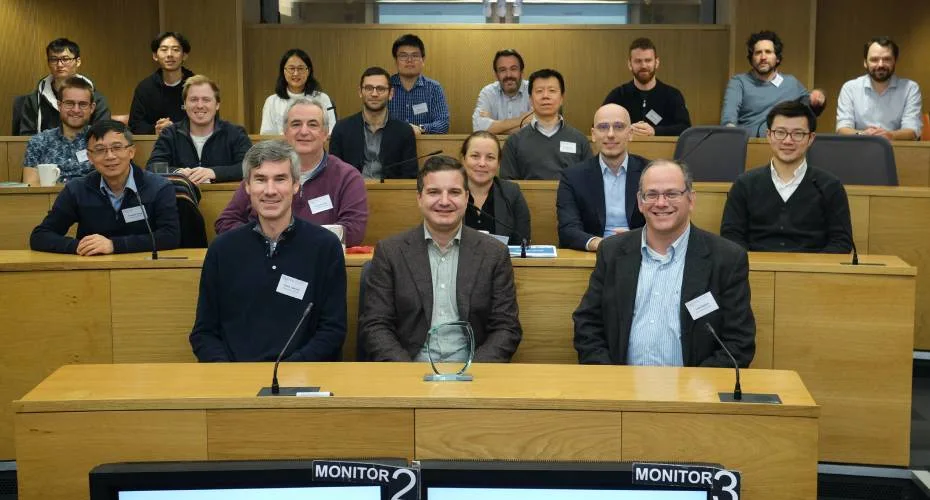
The winners of the 2019 Exeter Prize are Samuel M. Hartzmark (University of Chicago) and Kelly Shue (Yale University) for their paper “A Tough Act to Follow: Contrast Effects in Financial Markets”, published in The Journal of Finance.
The paper provides evidence that contrast effects exist in an important real-world setting: Financial markets. The contrast effect has previously been shown to be a psychological bias that inversely distorts humans’ perception of information. That is, individuals perceive signals as higher or lower than their true values, depending on what the recently observed signal was – even if that “benchmark” signal is actually irrelevant for the present evaluation. While this bias has been demonstrated primarily in controlled laboratory environments, evidence from the field is more limited but available for individual decision making contexts of, for example, speed dating and consumer housing and commuting choices. Hartzmark and Shue’s paper goes substantially further by providing evidence for the existence of contrast effects in the presence of typically disciplining arbitrage opportunities and expertise; that is, in sophisticated markets with professionals who make repeated investment decisions. Hartzmark and Shue show that contrast effects to preceding earnings’ announcements of oftentimes even irrelevant firms distort equilibrium prices and capital allocation. Furthermore, they find that this costly mispricing effect reverses within approximately 50 trading days. Finally, the authors argue convincingly that this contrast effect likely biases perceptions of news rather than expectations. Together, Hartzmark and Shue’s paper demonstrates to us that markets may not be as efficient as economists typically assume: Prices react not only to the absolute content of information but are also prone to perceptional errors stemming from relative comparisons.
The winning paper was selected by the panel of Nina Mazar (Boston University), Rosemarie Nagel (ICREA-UPF-Universitat Pompeu Fabra), and Eyal Winter (Hebrew University of Jerusalem and Lancaster University)
Samuel will be visiting the University of Exeter to receive the award and give a public lecture.
This year was again exceptionally competitive with a large number of excellent nominations. In addition to the winner, this year’s shortlist was:
- Andersen, S., Cox, J. C., Harrison, G. W., Lau, M. I., Rutström, E. E., & Sadiraj, V. (2018). Asset Integration and Attitudes toward Risk: Theory and Evidence. Review of Economics and Statistics, 100(5), 816-830.
- Apesteguia, J., & Ballester, M. A. (2018). Monotone stochastic choice models: The case of risk and time preferences. Journal of Political Economy, 126(1), 74-106.
- Baillon, A., Huang, Z., Selim, A., & Wakker, P. P. (2018). Measuring ambiguity attitudes for all (natural) events. Econometrica, 86(5), 1839-1858.
- Sanchez, C., & Dunning, D. (2018). Overconfidence among beginners: Is a little learning a dangerous thing?. Journal of Personality and Social Psychology, 114(1), 10-28.
2018
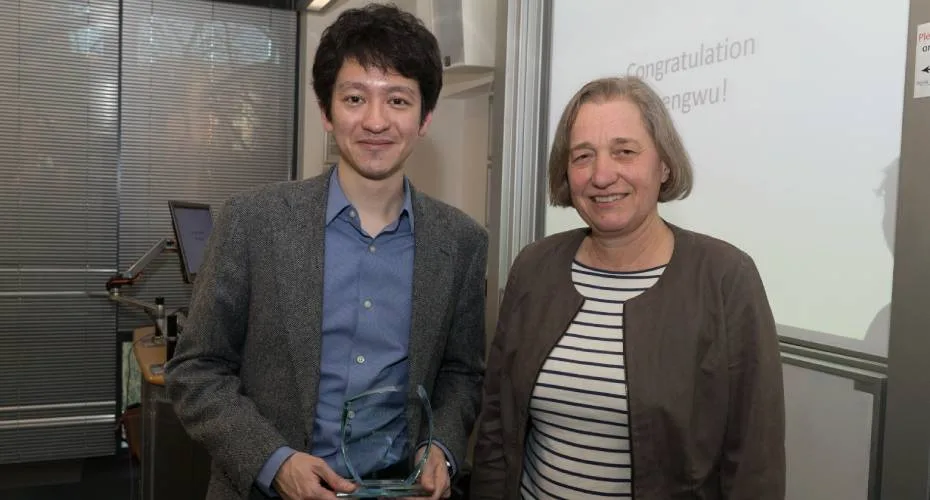
The winner of the 2018 Exeter Prize is Shengwu Li (Harvard University) for his paper “Obviously Strategy-Proof Mechanisms”, published in the American Economic Review.
The paper proposes and analyzes a desirable property for mechanisms implementing social outcomes. A mechanism is a game whose rules are designed by a social planner for the purpose of implementing a certain desirable social outcome (e.g., efficiency or fairness). Such mechanisms are always designed under the assumption that the parties involved will play an equilibrium outcome. Strategy Proof mechanisms received special attention in the literature, because they implement an outcome that is not only an equilibrium, but also one with dominant strategies, i.e., no player can do anything better than playing the strategy that leads to the socially desirable outcome, no matter what other people are doing. Yet as experimental and empirical results have shown, in real life, strategy proof mechanisms don’t always guarantee that players will do what they are expected to do. This is mainly because the reasoning behind the “right thing to do” is often complicated even in cases that admit a dominant-strategy equilibrium (one prominent mechanism of this sort is the second-price auction). Li’s paper proposes a concept of “obvious mechanisms.” This mechanism not only admits a dominant-strategy equilibrium, but also guarantees that it is cognitively simple to confirm that playing anything else is irrational. Li’s approach allows us to make mechanism design theory more applicable, and closer to reality. It warns us against choosing social mechanisms that we as game theorists hold to be secure, but when applied in the real-world will prove to be too complicated for people to do the right thing.
The winning paper was selected by the panel of Rosemarie Nagel (Pompeu Fabra University), Michel Regenwetter (University of Illinois) and Eyal Winter (Hebrew University of Jerusalem and Lancaster University)
Other 2018 Finalists
- Chew, Soo Hong, Bin Miao, and Songfa Zhong. "Partial ambiguity." Econometrica 85.4 (2017): 1239-1260.
- Glover, Dylan, Amanda Pallais, and William Pariente. "Discrimination as a self-fulfilling prophecy: Evidence from French grocery stores." The Quarterly Journal of Economics 132.3 (2017): 1219-1260.
- Kessler, Judd B. "Announcements of support and public good provision." American Economic Review 107.12 (2017): 3760-87.
2017
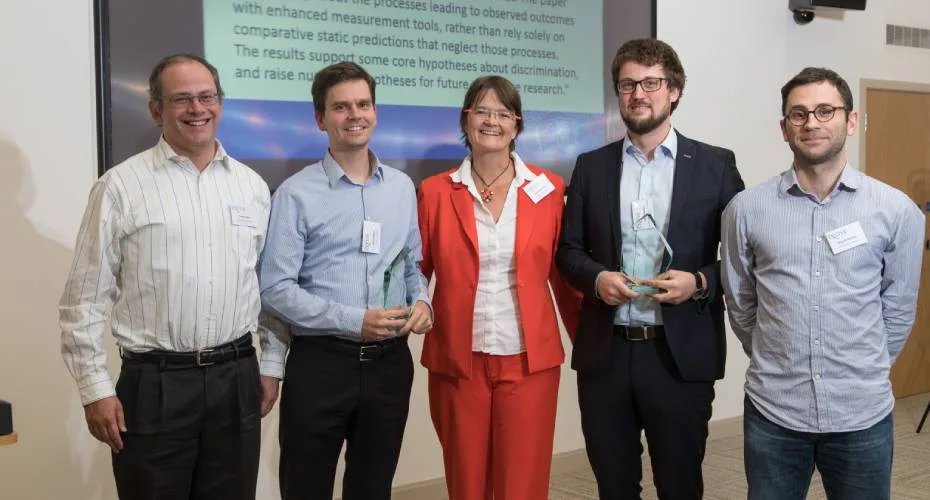
The winners of the 2017 Exeter Prize are Vojtěch Bartoš (LMU), Michal Bauer (CERGE-EI), Julie Chytilová (FSV-CUNI), and Filip Matějka (CERGE-EI) for their paper "Attention Discrimination: Theory and Field Experiments with Monitoring Information Acquisition", published in the American Economic Review.
The paper proposes a theory of discrimination in which levels of attention to information about applicants to a market depend both on whether the applicant is a member of an “attractive” group and on the structural features of the market. Methodologically, it seeks to test theory about the processes leading to observed outcomes with enhanced measurement tools, rather than rely solely on comparative static predictions that neglect those processes. Field experiments complement prior laboratory research into the processes of selective attention, and span rental housing and labor markets in the Czech Republic and Germany. The results support some core hypotheses about discrimination, and raise nuanced hypotheses for future normative research.
The winning paper was selected by the panel of Glenn Harrison (Georgia State University), Michael Mandler (Royal Holloway, University of London), and Michel Regenwetter (University of Illinois).
Other 2017 finalists
- Arthur E. Attema, Han Bleichrodt, Yu Gao, Zhenxing Huang and Peter P. Wakker. "Measuring discounting without measuring utility." published in American Economic Review.
- Stefano Ballieti, Robert L. Goldstone and Dirk Helbing. "Peer review and competition in the Art Exhibition Game." published in Proceedings of the National Academy of Sciences.
- Daniel L. Chen, Tobias J. Moskowitz and Kelly Shue. "Decision making under the gambler’s fallacy: evidence from asylum judges, loan officers, and baseball umpires." published in the Quarterly Journal of Economics.
- Cary Frydman and Colin F. Camerer. "Neural evidence of regret and its implications for investment behavior." published in the Review of Financial Studies.
2016

The winners of the Exeter Prize 2016 for Research in Experimental Economics, Decision Theory and Behavioral Economics are David V. Budescu (Fordham University) and Eva Chen (University of Pennsylvania) for their paper “Identifying Expertise to Extract the Wisdom of the Crowds”, Management Science, 61(2), 2015, 267-280.
How can one more accurately predict a future event, by asking many people or by seeking the advice of a few experts? This paper examines a middle ground between reliance on quantity (a crowd) and quality (experts). Since Condorcet’s work on the mathematical theory of voting in the 18th century, scholars have considered the idea that, collectively, we can cancel out individual biases and make better decisions under certain conditions and ways of aggregating individual opinions.
What is now known as the “wisdom of the crowds” refers to the ability of a large group to outperform individuals in tasks such as predicting a future event. At the same time, the natural appeal of expert judges lies in their specialized skill sets and their superior knowledge of a given domain. This paper develops a method for incorporating the wisdom of the crowds with expertise by identifying experts in a crowd and measuring their contribution to the crowd’s overall performance.
The proposed method, based on the simple idea of attributing higher weight to well performing experts, is tested in a large scale empirical study and exhibits a good performance. This paper will likely stimulate further research to improve the method. For example, possible refinements may take into account the incentives and strategic considerations of experts to report their beliefs truthfully.
The winning paper was selected by the panel of Glenn Harrison (Georgia State University), Michel Regenwetter (University of Illinois), and Shmuel Zamir (Hebrew University and the University of Exeter).
Other 2016 finalists
- Apesteguia, Jose, and Miguel A. Ballester. "A measure of rationality and welfare." Journal of Political Economy 123, no. 6 (2015): 1278-1310.
- Krajbich, Ian, Björn Bartling, Todd Hare, and Ernst Fehr. "Rethinking fast and slow based on a critique of reaction-time reverse inference." Nature Communications 6 (2015).
- Plonsky, Ori, Kinneret Teodorescu, and Ido Erev. "Reliance on small samples, the wavy recency effect, and similarity-based learning." Psychological Review 122, no. 4 (2015): 621.
- Powdthavee, Nattavudh, and Yohanes E. Riyanto. "Would you pay for transparently useless advice? A test of boundaries of beliefs in the folly of predictions." Review of Economics and Statistics 97, no. 2 (2015): 257-272.
2015
The winners of the Exeter Prize 2015 for Research in Experimental Economics, Decision Theory and Behavioral Economics are Gary Charness (UCSB) , Francesco Feri (Royal Holloway), Miguel Melendez (Malaga), and Matthias Sutter (Cologne and Innsbruck) for their paper "Experimental games on networks: underpinnings of behavior and equilibrium selection" published in Econometrica in 2014.
This paper provides a balanced portfolio of theory, experimental design, and the pursuit of alternative explanations for behavioral puzzles. Considering designs that span a wide range of interesting networks, they find that theory predicts behavior tightly when there is a unique equilibrium. And when there are multiple equilibria, traditional characteristics describing the network play an important role in describing behavior. Their study establishes a careful, informed behavioral base from which further research into network behavior will proceed.
The winning paper was selected by the panel of Glenn Harrison (Georgia State University), David Budescu (Fordham University), and Shmuel Zamir (Hebrew University and the University of Exeter). Francesco and Miguel visited the University of Exeter in November 2014, presented their current research on the topic and received the award.
Other 2015 finalists
- Bursztyn, Leonardo, Florian Ederer, Bruno Ferman, and Noam Yuchtman. "Understanding mechanisms underlying peer effects: Evidence from a field experiment on financial decisions" published in Econometrica.
- Coffman, Katherine Baldiga. "Evidence on Self-Stereotyping and the Contribution of Ideas" published in The Quarterly Journal of Economics.
- Gul, Faruk, and Wolfgang Pesendorfer. "Expected uncertain utility theory", published in Econometrica.
2014
The winner of the Exeter Prize 2014 for Research in Experimental Economics, Decision Theory and Behavioral Economics is Tomasz Strzalecki (Harvard University) for his paper "Temporal Resolution of Uncertainty and Recursive Models of Ambiguity Aversion" published in Econometrica in 2013.
Other 2014 finalists
- Barseghyan, L., Molinari, F., O'Donoghue, T. and Teitelbaum, J. 2013. "The Nature of Risk Preferences: Evidence from Insurance Choices." American Economic Review 103(6), 2499-2529.
- Gurdal, M.Y., Miller, J.B., and Rustichini, A. 2013. "Why Blame?" Journal of Political Economy 121 (6), 1204-1247.
- Sah, S., Lowenstein, G., and Cain, D. 2013. "The Burden of Disclosure: Increased Compliance With Distrusted Advice." Journal of Personality and Social Psychology 104(2), 289-304.
- Sonnemann, U., Camerer, C.F., Fox, C.R., and Langer, T. 2013. "How Psychological Framing Affects Economic Market Prices in the Lab and Field." Proceedings of the National Academy of Sciences 110 (29), 11779-11784.
2013
The winners of the Exeter Prize 2013 for Research in Experimental Economics, Decision Theory and Behavioral Economics are Daniel Friedman, (UC Santa Cruz) and Ryan Oprea (UC Santa Barbara) for their paper "A Continuous Dilemma" by published in American Economic Review in 2012.
Other 2013 finalists
- “Shifting the Blame: On Delegation and Responsibility”, by Bjorn Bartling and Urs Fischbacher in the Review of Economic Studies
- “The Behavioralist Visits the Factory: Increasing Productivity Using Simple Framing Manipulations”, by Tanjim Hossain and John List in Management Science.
- “Social Sampling Explains Apparent Biases in Judgments of Social Environments”, Mirta Galesic, Henrik Ollsson & Jorg Rieskamp in Psychological Science
- “Revealed Attention”, by Yusufcan Masatliogu, Daisuke Nakajima and Erkut Ozbay in the American Economic Review
- “Eliciting Welfare Preferences from Behavioral Datasets”, by Ariel Rubinstein and Yuval Salant in the Review of Economic Studies
2012
The winner of the inaugural Exeter Prize 2012 for Research in Experimental Economics, Decision Theory and Behavioral Economics is "Transitivity of Preferences" by Michel Regenwetter, Jason Dana and Clintin P. Davis-Stober, published in Psychological Review in 2011.
Other 2012 finalists
- “Performance Pay and Multidimensional Sorting: Productivity, Preferences and Gender” by Thomas Dohmen and Armin Falk published in American Economic Review.
- “Is Tiger Woods Loss Averse? Persistent Bias in the Face of Experience, Competition, and High Stakes” by Devin Pope and Maurice Schweitzer published in the American Economic Review.
- “Judicial In-Group Bias in the Shadow of Terrorism” by Moses Shayo and Asaf Zussman published in the Quarterly Journal of Economics.
- “Axiomatic Foundations of Multiplier Preferences” by Tomasz Strzalecki published in Econometrica.




